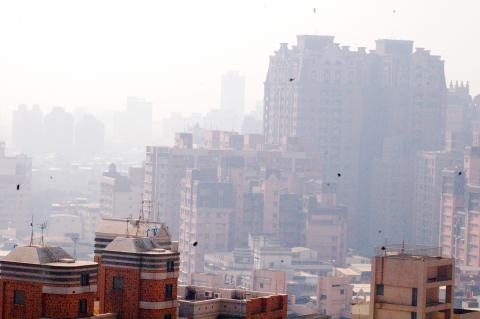The air pollution levels in all the nation’s cities and counties — except for Hualien and Taitung — failed to meet national standards for three consecutive years, thereby qualifying for the highest level in the Environmental Protection Administration’s (EPA) three-tier classification system for air-pollution-control zones.
The EPA yesterday released its monitoring data on PM2.5 — fine particulate matter measuring 25 micrometers in diameter or smaller — for the past three years, and only Hualien and Taitung had average PM2.5 levels lower than the EPA’s annual limit of 15 micrograms per cubic meter.
The national average PM2.5 concentration for the period was 23.1 micrograms per cubic meter, and Yunlin and Kinmen counties and Chiayi were the most polluted areas, with average PM2.5 concentrations of 33.3 micrograms per cubic meters, 31.5 micrograms and 32.7 micrograms respectively — more than double the EPA’s limit.

Photo: Huang Liang-chieh, Taipei Times
Under the EPA’s system, national parks and nature reserves are class-one air-pollution control zones; class-two zones are places where air quality meets national standards, while those areas where the air quality falls below standards for three years in a row are class-three zones.
The standards include indices of PM2.5, PM10, ozone, carbon dioxide, sulphur dioxide and nitrogen dioxide. Monitoring of PM2.5 levels began in 1997, but they were only included as an air quality index in 2012.
At present, only Kaohsiung and Pingtung are designated as a class-three zones due to their excessive PM10 and ozone levels.
This means that industries in the two locations are required to reduce emissions by 5 percent.
Taiwan Healthy Air Action Alliance founder Yeh Guang-peng (葉光芃) said that while the PM2.5 levels of many cities and counties were so high that it was clear by 2014 that these areas would quality as class-three zones by the end of last year, the EPA did not take steps to curb pollution.
The agency instead opted to allow pollution to continue at its current pace, Yeh said.
“Although three years of monitoring is the legal basis for designating control zones, the EPA should not be content to simply follow legal stipulations,” Yeh said.
“It should have taken proactive measures, designating these areas as class-three zones and implementing emergency measures to curb pollution,” Yeh said.
However, the EPA said the average PM2.5 and PM10 levels last year were 20 percent lower than those of 2008, and concentrations of traditional pollutants such as sulphur dioxide and nitrogen dioxide also dropped by more than 20 percent.
It has established more than 200 sets of regulations to control industrial and traffic emissions, the agency said.
It said it was also working to facilitate the replacement of outdated and energy-intensive facilities to lower the national PM2.5 level to 15 micrograms per cubic meter by 2020.

INVESTIGATION: The case is the latest instance of a DPP figure being implicated in an espionage network accused of allegedly leaking information to Chinese intelligence Democratic Progressive Party (DPP) member Ho Jen-chieh (何仁傑) was detained and held incommunicado yesterday on suspicion of spying for China during his tenure as assistant to then-minister of foreign affairs Joseph Wu (吳釗燮). The Taipei District Prosecutors’ Office said Ho was implicated during its investigation into alleged spying activities by former Presidential Office consultant Wu Shang-yu (吳尚雨). Prosecutors said there is reason to believe Ho breached the National Security Act (國家安全法) by leaking classified Ministry of Foreign Affairs information to Chinese intelligence. Following interrogation, prosecutors petitioned the Taipei District Court to detain Ho, citing concerns over potential collusion or tampering of evidence. The

TRADE: The premier pledged safeguards on ‘Made in Taiwan’ labeling, anti-dumping measures and stricter export controls to strengthen its position in trade talks Products labeled “made in Taiwan” must be genuinely made in Taiwan, Premier Cho Jung-tai (卓榮泰) said yesterday, vowing to enforce strict safeguards against “origin laundering” and initiate anti-dumping investigations to prevent China dumping its products in Taiwan. Cho made the remarks in a discussion session with representatives from industries in Kaohsiung. In response to the US government’s recent announcement of “reciprocal” tariffs on its trading partners, President William Lai (賴清德) and Cho last week began a series of consultations with industry leaders nationwide to gather feedback and address concerns. Taiwanese and US officials held a videoconference on Friday evening to discuss the

NEGOTIATIONS: The US response to the countermeasures and plans Taiwan presented has been positive, including boosting procurement and investment, the president said Taiwan is included in the first group for trade negotiations with the US, President William Lai (賴清德) said yesterday, as he seeks to shield Taiwanese exporters from a 32 percent tariff. In Washington, US Trade Representative Jamieson Greer said in an interview on Fox News on Thursday that he would speak to his Taiwanese and Israeli counterparts yesterday about tariffs after holding a long discussion with the Vietnamese earlier. US President Donald Trump on Wednesday postponed punishing levies on multiple trade partners, including Taiwan, for three months after trillions of US dollars were wiped off global markets. He has maintained a 10 percent

PERSONAL DATA: The implicated KMT members allegedly compiled their petitions by copying names from party lists without the consent of the people concerned Judicial authorities searched six locations yesterday and questioned six people, including one elderly Chinese Nationalist Party (KMT) member and five KMT Youth League associates, about alleged signature forgery and fraud relating to their recall efforts against two Democratic Progressive Party (DPP) legislators. After launching a probe into alleged signature forgery and related fraud in the KMT’s recall effort, prosecutors received a number of complaints, including about one petition that had 1,748 signatures of voters whose family members said they had already passed away, and also voters who said they did not approve the use of their name, Taipei Deputy Chief Prosecutor